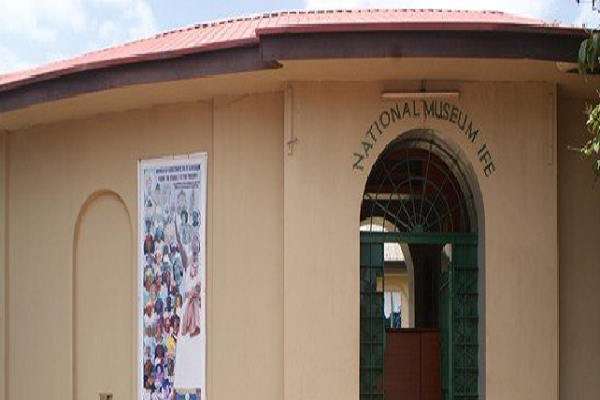Several towns and villages dot the landscape along the route leading to Osoogun, the ancestral homeland of the revered late Ajayi Crowther.
Preceding Osoogun from Iseyin are Odo-Ogun, Ado-Awaye, Wasimi, and Adekola towns, each marking its presence along both sides of the road.
Upon entering Osoogun off the Iseyin-Ibarapa road, the town’s distinctive character becomes apparent within a few meters. The extensive acres of cashew trees and various other crops flanking the dusty and uneven road serve as a testament to its agrarian essence and agricultural prosperity.
The town’s historical significance is further underscored by the presence of a primary school named after Ajayi Crowther, the town’s most celebrated native.
However, judging by the appearance of the classroom block, it is evident that the primary school has weathered the passage of time and is in need of structural rehabilitation.
Indeed, Osoogun lacks appreciable presence of modern day advancement, with natives lamenting absence of government in the town, despite its contribution to the rich historical perspective of Oyo State and Nigeria. With the humble appearance of the community and the tranquil ambiance of the town’s surroundings, it is clear that the residents of Osoogun lead a modest lifestyle. To enhance their quality of life, what they truly need is focused attention on the provision of fundamental amenities.
Born in Osoogun in 1809, Ajayi Crowther and his family were forcibly taken from their home by slave raiders when he was just 12 years old. Sold to Portuguese slave traders in March 1821, Crowther was transported across the African continent until his liberation from a slave ship. He was subsequently resettled in Freetown, Sierra Leone, where his missionary journey within the Anglican Church and eventual return to Nigeria commenced.
Despite experiencing the horrors of slavery in his youth, Crowther was dedicated to education and missionary endeavours.
In Osoogun, remnants of the slave trade and several historical sites hold the potential to attract tourists and foster development. However, nearly all of these promising tourist destinations have fallen into significant disrepair and are slowly deteriorating.
But Osoogun is not completely neglected by everyone who has a stake in the history of the town.
After more than two centuries since Crowther’s abduction, Osoogun still thrives under the influence of its esteemed son. This enduring legacy is primarily attributed to Crowther’s missionary endeavours within the Anglican Church, which also founded Ajayi Crowther University, Oyo. Through the dedicated efforts of the management of ACU, named in honour of Bishop Ajayi Crowther, the town is undergoing a gradual and well-deserved transformation.
Today, the most prominent tree in Osoogun and its surroundings is a towering baobab tree located approximately about 300 meters away from the Crowther family cottage, where they were seized 203 years ago. Following his abduction, Crowther was bound to this very tree before embarking on his fateful journey overseas.
Pointing to its historical significance is a rusty sign post indicating that Crowther was bound to the tree following his capture. Of note to the continued existence of the tree is the resolute commendable determination of the Osoogun community to safeguard it rather than fell it for economic gain.
But the ambience of the imposing tree itself does not evoke an atmosphere conducive of a tourist destination.
The remnants of the Crowther family home represent yet another potential tourist attraction but currently lack the appropriate reverence for the man who translated the Bible into indigenous languages.
While leading a team of ACU representatives on a visit to Osoogun recently, the Deputy Vice-Chancellor of Ajayi Crowther University, Prof Muyiwa Popoola, acknowledged that the significant oversights, deficiencies and the potential to elevate the modest Osoogun town are major concerns of the Vice Vice Chancellor, Prof. Timothy Abiodun Adebayo and the management.
He explained that there are plans for the construction of a befitting structure around the base and vicinity of the expansive baobab tree where Crowther was bound, along with the reconstruction of the family home to preserve its ancient characteristics. These initiatives, he said are aimed to elevate key locations linked to Ajayi Crowther in Osoogun into premier tourist destinations.
The ACU campus in Osoogun, which covers 100 acres of land, has several blocks of lecture halls and offices. It completes with construction of borehole for regular water supply and sanitary facilities. A construction of bridge over a stream along the road leading to the school was recently completed for easy access to the campus and other parts of Osoogun community.
Already, the campus is operational with part-time lectures being held and more activities, like workshop and entrepreneurial training, are being planned to hold on the campus.
Several years ago, ACU erected a primary health center in Osoogun, known as Crowther Hospital. The pathway leading to the facility and the hospital premises itself were fitted with solar lighting system.
Additionally, a matron, hired by ACU, oversees the operations of the center along with other essential staff members. The matron lives with her family in Anglican Church mission house within the town.
One of the notable edifices in Osoogun is a large compound comprising four two-storey buildings. Constructed by the late Adewole Adetunji, an Ibadan indigene merchant and farmer who once resided in the town, this deteriorating structure now accommodates several residents, including one of the daughters of the late owner, who goes by the name Musiliu.
Amidst a landscape dominated by mud houses whose construction dates back over a century, and a plethora of rusty corrugated iron roofs, Adetunji’s residence, along with a handful of others, faintly adds to the raw aesthetic appeal of the Osoogun community. However, none can rival the structure newly constructed by ACU for the traditional ruler of the town.
For the past 23 years, Moses Olalere has held the position of traditional leader in Osoogun. Prior to the intervention of ACU, he resided in his own home.
However, with the construction of a modern palace by ACU, he now inhabits a residence befitting the leader of a town that produced such a distinguished figure as Ajayi Crowther, renowned for his missionary work and exemplary contribution to education.
Before the dedication and official handover of the palace, King Adelere received a delegation from Ajayi Crowther University, during which he spoke of the town’s lamentable condition prior to his ascension to the throne. As a native of Osoogun, born and raised in the town, he is a first-hand witness to its past and present state.
“This town was once a source of sadness to us; there was nothing here except dilapidated old houses and bad road network. We lived in darkness. But God used Anglican Church to transform the town. We had a church building built by our forefathers many decades ago.
“But the old church building collapsed gradually and people began to patronise other denominations. I also left the church and began to worship at Cherubim and Seraphim church. But After the Anglican Church intervened with a vast church building, vicarage and other facility, we went back to worship in the church. The water facility installed for the church is also accessible to numerous individuals within the community, benefiting a wide range of residents.
“The new palace and the campus have transformed ACU Osoogun. We owe gratitude to the fact that Osoogun was blessed with a distinguished figure in
Bishop Ajayi Crowther, whose legacy has remained instrumental in fostering development within the town,” Adelere said.
While the Church and the university have provided some relief for the Osoogun community, there still remain significant gaps in meeting the basic needs of the people. Addressing these needs requires the concerted efforts of those in positions of authority who have the capacity to make meaningful and sustainable changes for the betterment of the community.
Femi Atoyebi writes from Ajayi Crowther University, Oyo.









